|
|
|
Sort Order |
|
|
|
Items / Page
|
|
|
|
|
|
|
| Srl | Item |
| 1 |
ID:
101589
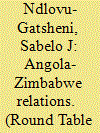

|
|
|
|
|
| Publication |
2010.
|
| Summary/Abstract |
The common approach to the study of foreign policies of Southern African Development Community (SADC) states is to locate them within the context of 'brother presidents' and 'sister liberation movements'. There is emphasis on liberation war camaraderie as a key variable. However, Angola-Zimbabwe (read as MPLA-ZANU-PF and MPLA-MDC) relations have no noticeable strong liberation war-time ties. The relations are traceable to the post-1980 period when the Zimbabwe African National Union-Patriotic Front (ZANU-PF) pursued a deliberate policy of integrating itself within the SADC region and this coincided with the Popular Movement for the Liberation of Angola's (MPLA) long-time desire to isolate its internal enemies of the National Front for the Liberation of Angola and the National Union for the Total Independence of Angola. What is also noticeable is the opacity and ambiguities in Angola-Zimbabwe relations, which have provoked growth of speculation and suspicion. The only time Angola and Zimbabwe openly collaborated was in their intervention in the Democratic Republic of Congo war in 1998 under the auspices of the SADC in general and the SADC Organ on Politics, Defence and Security in particular. However, two recent developments-the state visit to Luanda by the Prime Minister of Zimbabwe and the leader of the Movement for Democratic Change (MDC-T) Morgan Tsvangirai in October 2009, and the announcement by ZANU-PF of the China-Sonangol $8bn investment deal in November 2009-have provoked fresh interest in understanding Angola-Zimbabwe relations in the context of a regional initiative to resolve the Zimbabwe crisis. Although Angola is visible as a member of the SADC in the search for a solution to the Zimbabwe crisis, it has not openly expressed its foreign policy towards Zimbabwe. Unlike Botswana under Ian Khama and Zambia under the late Levy Mwanawasa, which openly criticised President Robert Mugabe and ZANU-PF over governance and its human rights record, Angola has remained quiet, making it hard to know its exact position vis-agrave-vis initiatives towards resolution of the Zimbabwe crisis. Interest in Angolan foreign policy is further motivated by the fact of its ascendancy as one of the regional powers; building on its rich mineral resources, it has the potential leverage to help in the resolution of the Zimbabwe crisis if it openly expressed its position. At the moment, it is not clear whether Angola has also adopted 'quiet diplomacy', just like South Africa under President Thabo Mbeki in its dealings with Zimbabwe.
|
|
|
|
|
|
|
|
|
|
|
|
|
|
|
|
| 2 |
ID:
188940
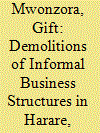

|
|
|
|
|
| Summary/Abstract |
Recent research on the informal sector has devoted considerable attention in examining how informal traders have been affected by the coronavirus in different temporal and spatial settings. However, less well understood is the extent to which central and local governments can cunningly use the veil of COVID-19 pandemic to regulate and re-shape the informal sector. Seeking to remedy this shortcoming in the prevailing accounts and utilising a qualitative research methodology including observations, discourse analysis, critical review of policy pronouncements, by-laws, legislation, video evidence from city officials, government, health authorities, vendors associations, newspapers articles and through a case study analysis of Harare City in Zimbabwe. The article contributes to the academic and policy discussions on how law, disease outbreak, policy and governmentality of African urban spaces intersect.
|
|
|
|
|
|
|
|
|
|
|
|
|
|
|
|
| 3 |
ID:
101590
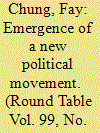

|
|
|
|
|
| Publication |
2010.
|
| Summary/Abstract |
Zimbabwe's turbulent electoral history is seldom recounted by a political insider. The author, a former Minister in a Zimbabwe African National Union-Patriotic Front (ZANU-PF) government, and a Senatorial candidate for Simba Makoni in the contentious 2008 elections, charts the electoral volatility of Zimbabwe, probes the advent and subsequent split in the Movement for Democratic Change, and champions the alternative provided by Simba Makoni, also once a Minister under Mugabe, who deserted ZANU-PF.
|
|
|
|
|
|
|
|
|
|
|
|
|
|
|
|
| 4 |
ID:
086092
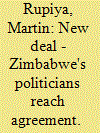

|
|
|
|
|
| Publication |
2009.
|
| Summary/Abstract |
Five months after the signing of a power-sharing agreement in Zimbabwe, a combination of international pressure and economic deterioration has facilitated its implementation. With the ruling Zimbabwe African Nation Union - Patriotic Front (ZANU-PF) agreeing to enter a coalition government with the opposition Movement for Democratic Change (MDC), a political compromise appears to have been reached, albeit a fragile one.
However, optimism over Zimbabwe's future stability needs to be tempered by a sober assessment of the agreement and the various actors in the deal. While both ZANU-PF and the MDC appear committed to the agreement in the short term, factionalism with ZANU-PF and the MDC, along with military discontent with the deal, could undermine its full implementation.
Image: President Robert Mugabe, centre, watched by Arthur Mutambara, left, shakes hands with Morgan Tsvangirai, the new prime minister of Zimbabwe, at the signing of the power-sharing deal ceremony in Harare on 15 September 2008.
|
|
|
|
|
|
|
|
|
|
|
|
|
|
|
|
| 5 |
ID:
165765


|
|
|
|
|
| Summary/Abstract |
This article uses the case of illegal street vending in Harare to explore the interface between urban governance and politics. Drawing on the ideas of urban governance and informal governance, it illustrates how polarisation between the opposition political party Movement for Democratic Change-dominated municipal council and the Zimbabwe African National Union Patriotic Front-led government is affecting governance in general and in particular Harare municipality’s ability to handle the illegal street vending problem. While the paper essentially identifies political expediency as the major reason why a lasting solution is elusive in handling the illegal street vending problem, it acknowledges that there are broad reasons for its persistence. Consequently, the article demonstrates some of the reasons why illegal street vending is difficult to end using the conventional methods and provides some alternatives.
|
|
|
|
|
|
|
|
|
|
|
|
|
|
|
|
| 6 |
ID:
178259
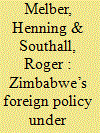

|
|
|
|
|
| Summary/Abstract |
Under the presidency of Mnangagwa, Zimbabwe’s foreign policy is characterized by the desire to ‘re-engage’ with the West with a view to securing the removal of sanctions and encouraging investment. In this, it has received the backing of the African Union and Southern African Development Community states. Simultaneously, the violence of the Mnangagwa regime has reinforced the reluctance of the West to remove sanctions, and Zimbabwe has even begun to test the patience of its neighbours. The government has placed renewed faith in the ‘Look East Policy’, but China is seeking to match its investments with tighter control.
|
|
|
|
|
|
|
|
|
|
|
|
|
|
|
|
| 7 |
ID:
101587
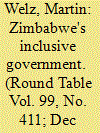

|
|
|
|
|
| Publication |
2010.
|
| Summary/Abstract |
Zimbabwe seemed to be in a political transition-but only on the surface. In actual fact, the new government established under the power-sharing agreement between President Mugabe and newly elected Prime Minister Morgan Tsvangirai proved unsuccessful in its first 100 days owing to continued rivalry and a lack of commitment on behalf of Mugabe and his party. Mugabe managed to secure key positions in the new government for his cronies. They continued to control the relevant security organs as well as the Reserve Bank, which held a key position because its Governor guarded the budget available for the new ministers. Consequently, sabotage was an imminent threat for the new government. Mugabe benefited from the weakness of the opposition, which was split and had an indecisive and uncharismatic leader who failed to secure financial support from the West. To complicate the situation even further there were more players involved in the political arena of Zimbabwe, including the two major farmers' groupings, an emerging third party under Simba Makoni, the trade unions and white businessmen. They all had their own agenda. Mugabe and his ruling clique relied on each other as they had both committed gross human rights violations over the last 25 years. They either fall together or their mutual dependency keeps them going. Change was unlikely to occur; even the new Movement for Democratic Change ministers were aware of this.
|
|
|
|
|
|
|
|
|
|
|
|
|
|
|
|
|
|
|
|
|